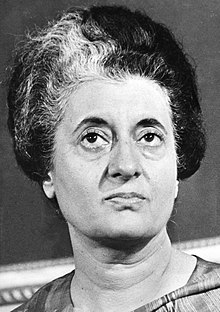Indira Gandhi
From Wikipedia, the free encyclopedia
| Indira Gandhi इन्दिरा गाँधी | |
|---|---|

Indira Gandhi
| |
| 3rd Prime Minister of India | |
| In office 14 January 1980 – 31 October 1984 | |
| President | Neelam Sanjiva Reddy Zail Singh |
| Preceded by | Charan Singh |
| Succeeded by | Rajiv Gandhi |
| In office 24 January 1966 – 24 March 1977 | |
| President | Sarvepalli Radhakrishnan Zakir Husain V. V. Giri Fakhruddin Ali Ahmed |
| Deputy | Morarji Desai |
| Preceded by | Gulzarilal Nanda (Acting) |
| Succeeded by | Morarji Desai |
| Minister of External Affairs | |
| In office 9 March 1984 – 31 October 1984 | |
| Preceded by | P. V. Narasimha Rao |
| Succeeded by | Rajiv Gandhi |
| In office 22 August 1967 – 14 March 1969 | |
| Preceded by | M. C. Chagla |
| Succeeded by | Dinesh Singh |
| Minister of Defence | |
| In office 14 January 1980 – 15 January 1982 | |
| Preceded by | Chidambaram Subramaniam |
| Succeeded by | R. Venkataraman |
| In office 30 November 1975 – 20 December 1975 | |
| Preceded by | Swaran Singh |
| Succeeded by | Bansi Lal |
| Minister of Home Affairs | |
| In office 27 June 1970 – 4 February 1973 | |
| Preceded by | Yashwantrao Chavan |
| Succeeded by | Uma Shankar Dikshit |
| Minister of Finance | |
| In office 16 July 1969 – 27 June 1970 | |
| Preceded by | Morarji Desai |
| Succeeded by | Yashwantrao Chavan |
| Minister of Information and Broadcasting | |
| In office 9 June 1964 – 24 January 1966 | |
| Prime Minister | Lal Bahadur Shastri |
| Preceded by | Satya Narayan Sinha |
| Succeeded by | Kodardas Kalidas Shah |
| Personal details | |
| Born | Indira Priyadarshini Nehru 19 November 1917 Allahabad, United Provinces,British India |
| Died | 31 October 1984 (aged 66) New Delhi, India |
| Political party | Indian National Congress |
| Spouse(s) | Feroze Gandhi |
| Children | Rajiv Sanjay |
| Parents | Jawaharlal Nehru Kamala Nehru |
| Alma mater | Visva-Bharati University Somerville College, Oxford |
| Religion | Hinduism |
| Signature | |
Indira Priyadarshini Gandhi (Hindustani: [ˈɪnːdɪrə ˈɡaːnd̪ʱi] ( listen); néeNehru; 19 November 1917 – 31 October 1984) was a key 20th centurystateswoman, a central figure of the Indian National Congress party, and to date the only female Prime Minister of India. Indira Gandhi was the only child of India's first Prime Minister, Jawaharlal Nehru. She served as Prime Minister from 1966 to 1977 and then again from 1980 until her assassination in 1984, making her the second-longest-serving Prime Minister after her father.
listen); néeNehru; 19 November 1917 – 31 October 1984) was a key 20th centurystateswoman, a central figure of the Indian National Congress party, and to date the only female Prime Minister of India. Indira Gandhi was the only child of India's first Prime Minister, Jawaharlal Nehru. She served as Prime Minister from 1966 to 1977 and then again from 1980 until her assassination in 1984, making her the second-longest-serving Prime Minister after her father.
Gandhi served as her father's personal assistant and hostess during his tenure as prime minister between 1947 and 1964. She was elected Congress President in 1959. Upon her father's death in 1964, Gandhi refused to enter Congress party leadership contest and instead chose to become a cabinet minister in the government led by Lal Bahadur Shastri. In Congress' party parliamentary leadership election held in early 1966 upon the death of Shastri, she defeated her rival, Morarji Desai, to become leader and thus succeed Shastri as the prime minister of India.
As the Prime Minister of India, Gandhi was known for her political ruthlessness and unprecedented centralisation of power. She went to war with Pakistan in support of the independence movement and war of independence in East Pakistan, which resulted in an Indian victory and the creation of Bangladesh, as well as increasing India's influence to the point where it became the regional hegemon of South Asia. Gandhi also presided over a controversialstate of emergency from 1975 to 1977 during which she ruled by decree. She was assassinated in 1984 by her Sikh bodyguards a few months after she ordered the storming of the Harmandir Sahib in Amritsar to counter the Punjab insurgency.
Contents
[hide]Early life and career[edit]
Indira Gandhi was born Indira Nehru in a Kashmiri Pandit family on 19 November 1917 in Allahabad.[1] Her father, Jawaharlal Nehru, was a leading figure in India's political struggle for independence from British rule, and became the first Prime Minister of the Union (and later Republic) of India.[2]She was the only child (a younger brother was born, but died young),[3] and grew up with her mother, Kamala Nehru, at the Anand Bhavan; a large family estate in Allahabad.[4] She had a lonely and unhappy childhood.[5] Her father was often


